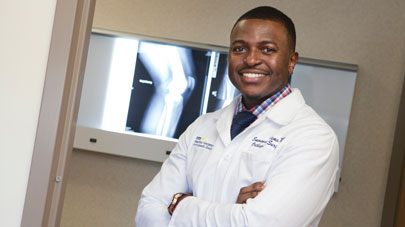Story
With the tragedies of the opioid epidemic splashed across the headlines regularly for the past several years, it is not surprising that some patients are concerned about being able to manage their pain without narcotics. Pain management is still possible and effective without the use of dangerous and sometimes addictive prescription pain medications, according to Emmanuel Atiemo, MD, orthopaedic surgeon and sports medicine specialist of the MedStar Orthopaedic Institute.
“Will I get addicted?” is one of the most frequently asked questions related to pain management asked by Dr. Atiemo’s patients. His answer: No. “Provided patients only take medication as needed, so if they are not in pain, they aren’t taking anything,” said Dr. Atiemo, “and you seek proper treatment. Many conditions can be treated — and thus, pain alleviated with alternative methods other than pain medicine.”
Edward Joy of Leonardtown was one of those patients concerned about taking narcotics following surgery.
“I don’t believe in them, because I don’t want to be hooked on them,” he said.
Edward found himself in Dr. Atiemo’s office last year facing a total knee replacement following a workplace accident.
“I had three orthoscopic surgeries over the years, but when I went back there was nothing left — it was bone-on-bone,” said Edward. “The pain was pretty severe.”
Physical therapy, injections, massage, and surgery are all methods Dr. Atiemo says can help patients live pain free. For major surgical procedures such as total join replacement, Dr. Atiemo uses a multimodal pain control method combining NSAIDs, Tylenol, and Neurontin, which blocks various pain pathways. Given on a scheduled basis, this combination can significantly reduce the need for narcotics.
“Many patients take pain medicine without even having a diagnosis or receiving proper treatment which could help eliminate the need for narcotics,” said Dr. Atiemo.
Patients who seek out treatment from an orthopaedic specialist most likely are in pain from an accident or chronic pain from a long-lasting, degenerative condition. Many of these patients may need surgery to correct or alleviate their condition. It is only natural for patients to be anxious about pain following surgery, but Dr. Atiemo explains pain will get better and proper management of pain is key to making that happen.
“The regimen he had me on worked very well,” Edward said. “I was back to work in two weeks on light duty and went back a month later full duty.”
“Pain control is key for proper recovery,” said Dr. Atiemo. “If pain is poorly controlled, then the patient does not rehab well and their outcome is guarded. Good pain control helps your mental state of mind and your physical well-being. For most surgeries, I don’t want you to be a couch potato or to be writhing in pain, and if pain resolves or is tolerable, then you should abstain from taking any pain medicine.”
Visit MedStarStMarys.org/Ortho for more information on orthopedic treatment.














